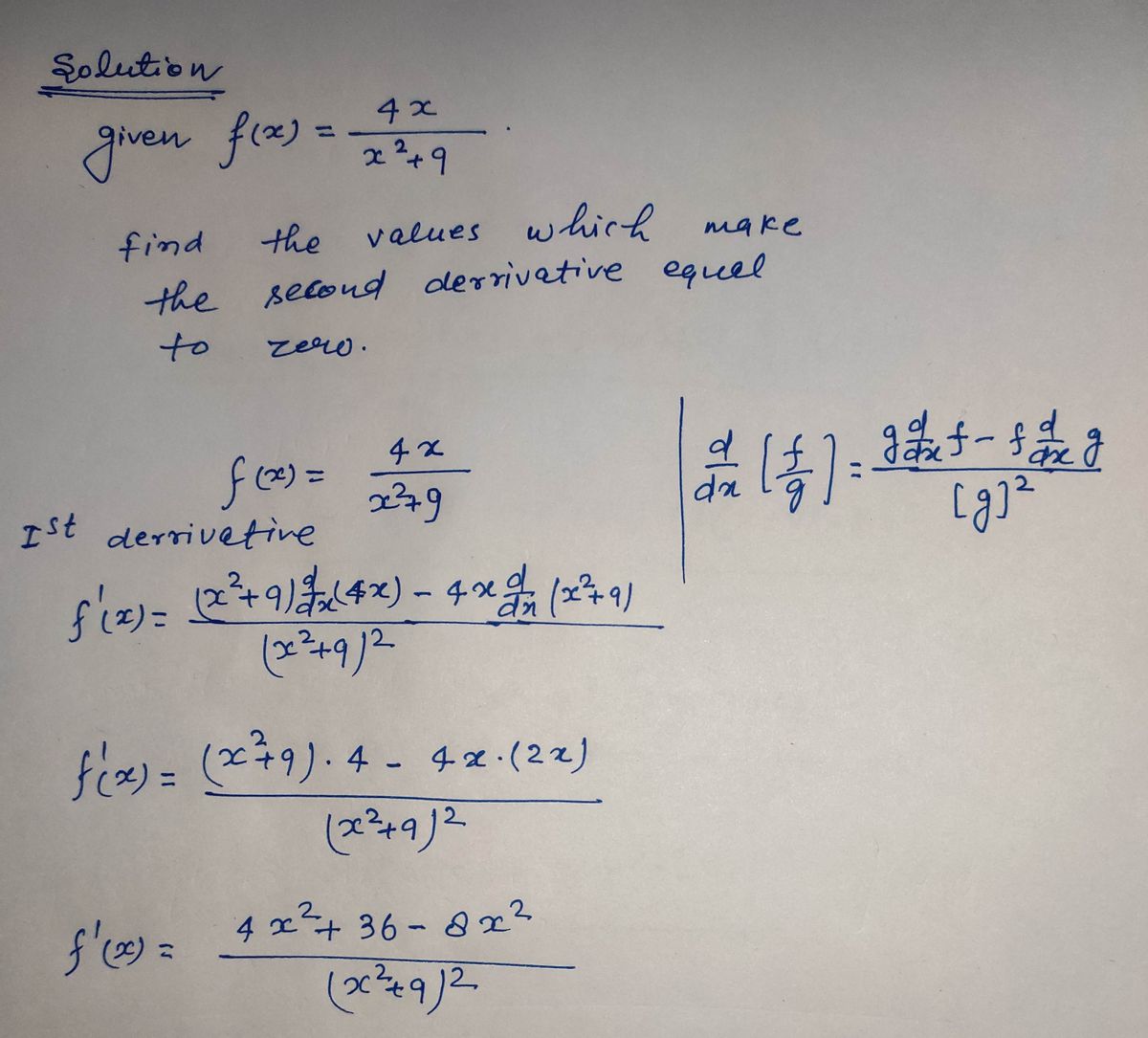Calculus: Early Transcendentals
8th Edition
ISBN:9781285741550
Author:James Stewart
Publisher:James Stewart
Chapter1: Functions And Models
Section: Chapter Questions
Problem 1RCC: (a) What is a function? What are its domain and range? (b) What is the graph of a function? (c) How...
Related questions
Question
![**Problem Statement:**
Given \( f(x) = \frac{4}{x} + 9 \), find the values which make the second derivative equal to zero.
**Solution:**
Let \( f(x) = \frac{4}{x} + 9 \).
1. **First Derivative:**
\[
f'(x) = \frac{d}{dx} \left( \frac{4}{x} + 9 \right) = \frac{d}{dx} \left( 4x^{-1} \right) = -4x^{-2} = -\frac{4}{x^2}
\]
2. **Second Derivative:**
\[
f''(x) = \frac{d}{dx} \left( -\frac{4}{x^2} \right) = \frac{d}{dx} \left( -4x^{-2} \right) = 8x^{-3} = \frac{8}{x^3}
\]
3. **Set the Second Derivative to Zero:**
\[
\frac{8}{x^3} = 0
\]
Since \(\frac{8}{x^3}\) can never be zero as the numerator is constant and non-zero, the equation \(\frac{8}{x^3} = 0\) has no solutions.
**Conclusion:**
There are no values of \(x\) for which the second derivative is equal to zero for the given function \(f(x) = \frac{4}{x} + 9\). The second derivative \(\frac{8}{x^3}\) is never zero.
---
This exercise guides students to understand how to compute first and second derivatives and determine the conditions under which a second derivative equals zero.](/v2/_next/image?url=https%3A%2F%2Fcontent.bartleby.com%2Fqna-images%2Fquestion%2F134ecf22-bc4f-408e-8872-9a07a7d72228%2Fa69cff75-cc34-43c5-afc7-5a9ff16fec2e%2Fvkzv9hm_processed.jpeg&w=3840&q=75)
Transcribed Image Text:**Problem Statement:**
Given \( f(x) = \frac{4}{x} + 9 \), find the values which make the second derivative equal to zero.
**Solution:**
Let \( f(x) = \frac{4}{x} + 9 \).
1. **First Derivative:**
\[
f'(x) = \frac{d}{dx} \left( \frac{4}{x} + 9 \right) = \frac{d}{dx} \left( 4x^{-1} \right) = -4x^{-2} = -\frac{4}{x^2}
\]
2. **Second Derivative:**
\[
f''(x) = \frac{d}{dx} \left( -\frac{4}{x^2} \right) = \frac{d}{dx} \left( -4x^{-2} \right) = 8x^{-3} = \frac{8}{x^3}
\]
3. **Set the Second Derivative to Zero:**
\[
\frac{8}{x^3} = 0
\]
Since \(\frac{8}{x^3}\) can never be zero as the numerator is constant and non-zero, the equation \(\frac{8}{x^3} = 0\) has no solutions.
**Conclusion:**
There are no values of \(x\) for which the second derivative is equal to zero for the given function \(f(x) = \frac{4}{x} + 9\). The second derivative \(\frac{8}{x^3}\) is never zero.
---
This exercise guides students to understand how to compute first and second derivatives and determine the conditions under which a second derivative equals zero.
Expert Solution
Step 1

Step by step
Solved in 3 steps with 3 images

Recommended textbooks for you

Calculus: Early Transcendentals
Calculus
ISBN:
9781285741550
Author:
James Stewart
Publisher:
Cengage Learning

Thomas' Calculus (14th Edition)
Calculus
ISBN:
9780134438986
Author:
Joel R. Hass, Christopher E. Heil, Maurice D. Weir
Publisher:
PEARSON

Calculus: Early Transcendentals (3rd Edition)
Calculus
ISBN:
9780134763644
Author:
William L. Briggs, Lyle Cochran, Bernard Gillett, Eric Schulz
Publisher:
PEARSON

Calculus: Early Transcendentals
Calculus
ISBN:
9781285741550
Author:
James Stewart
Publisher:
Cengage Learning

Thomas' Calculus (14th Edition)
Calculus
ISBN:
9780134438986
Author:
Joel R. Hass, Christopher E. Heil, Maurice D. Weir
Publisher:
PEARSON

Calculus: Early Transcendentals (3rd Edition)
Calculus
ISBN:
9780134763644
Author:
William L. Briggs, Lyle Cochran, Bernard Gillett, Eric Schulz
Publisher:
PEARSON

Calculus: Early Transcendentals
Calculus
ISBN:
9781319050740
Author:
Jon Rogawski, Colin Adams, Robert Franzosa
Publisher:
W. H. Freeman


Calculus: Early Transcendental Functions
Calculus
ISBN:
9781337552516
Author:
Ron Larson, Bruce H. Edwards
Publisher:
Cengage Learning